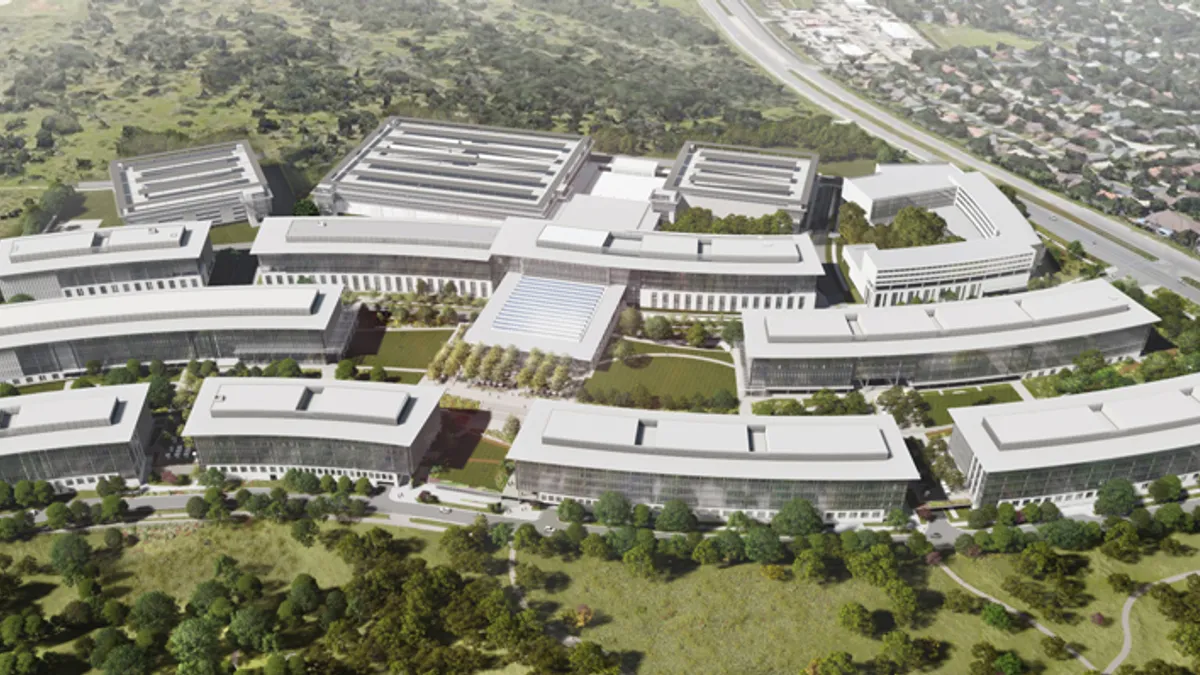Dive Brief:
- Apple has started construction on a new $1 billion campus in Austin, Texas, the company announced this week. The facility is located near its Mac Pro facility, which began producing the firm's latest top-of-the-line computer this month. The general contractor of the project has not been publicly identified.
- The 3-million-square-foot development, which is slated to be completed sometime in 2022, will be able to accommodate 5,000 employees at first, but Apple's plan includes an eventual 15,000. Apple will power the buildings with solar power generated on site, and the 133-acre campus will feature a 50-acre nature preserve, which will help the company achieve a total of 60% green space.
- The Austin campus is part of the company's commitment to make $30 billion of capital investments in the U.S. from 2018 to 2023. During a press conference earlier this year, Kristina Raspe, vice president of global real estate and facilities for Apple, said that construction of the first building should take between 30 and 36 months.
Dive Insight:
Austin is becoming a tech hub in its own right, according to Karen Judson, vice president of Transwestern's marketing and communications in the commercial real estate company's Austin office. She said the Austin metro area is second only to Apple's Cupertino headquarters in the amount of square footage the company occupies. Apple has 1.5 million square feet in and around the Texas capital, counting both owned and leased properties. This excludes the aforementioned Mac Pro facility because, Judson said, it is leased and run by independent manufacturer Flextronics.
Apple, she said, joins tech companies like Facebook, Google, Oracle and others that have established operations in Austin. "Everybody has a big campus here," Judson said.
So what is it about Austin that makes it so attractive to big tech?
A young demographic — averaging around 33 years of age — and access to graduates from the University of Texas is one reason Apple and other companies are heading to Austin, Judson said. Unemployment has historically been low there, and even the Great Recession didn't destroy its housing market like it did in other U.S. metros but only "corrected overpriced housing."
Austin's cost of living is pretty much the highest in Texas but downright inexpensive when compared to other tech hubs like San Francisco and New York and when considering the fact there's no state income tax.
And the lure of Austin goes beyond the world of tech. According to the Urban Land Institute's "2020 Emerging Trends in Real Estate" report, Austin is the No. 1 U.S. market to watch next year in terms of the expectation of investor demand.
Judson said the influx of tech companies has driven home prices up but added that those same companies are building and leasing multifamily properties to make the move easier for employees who are relocating to the area.
And then there's Austin's culture. Judson calls the city "a blueberry in the big strawberry pie that is Texas," a reference to the city's liberal leanings compared with the rest of the state, which, she said, appeals to some tech companies.
Under construction now by real estate company Trammell Crow in downtown Austin, according to the Austin Business Journal, is a 723,000-square-foot tower, which is already 100% leased by Google. That building will be ready for the search engine giant in 2023.













